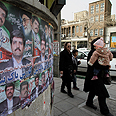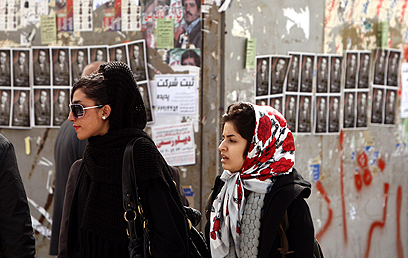
Iran votes in parliamentary elections
Faithful supporters of Iran's Khamenei flock to polls as clerical establishment hopes for high turnout to display its legitimacy
Faithful supporters of Iranian Supreme Leader Ayatollah Ali Khamenei flocked to the polls early on Friday but most reformists stayed home, saying the parliamentary election was meaningless.
Facing growing isolation and threats of Israeli military action over the Islamic Republic's disputed nuclear program, the clerical establishment needed a high turnout to display its legitimacy, badly damaged after President Mahmoud Ahmadinejad's re-election.
Related stories:
- Obama on Iran: Nobody's announced a war yet
- Khamenei: Iran not seeking nuclear weapons
- Ahmadinejad: Western embargo won't hurt Iran
"A turnout as big as Iran," was a headline on state television, which predicted a "historic" level of participation. State radio and television have played revolutionary songs in the past days to stir nationalist sentiment before the vote.

Iranians prepare to vote (Photo: EPA)
The authorities predicted a turnout of more than 65%, compared to 57% in the 2008 parliamentary vote.
Meanwhile, Police guarded main squares and streets in Tehran and other cities, but there were no immediate reports of violence.
"I am here to back Ayatollah Khamenei," shopkeeper Houman Riyazi, 50, said at a polling station in southern Tehran.
"I am slapping America in the face with my vote," seminary school student Reza Ghoreishi, 25, said in the holy Shi'ite Muslim city of Qom, echoing Khamenei's rhetoric.
"Death to America, death to Israel, death to all arrogant powers," he intoned.
According to the Washington Post on Wednesday, Many Iranians will vote to avoid getting into trouble, because their national ID cards are stamped at the polls.
Majid Shahriari, whose husband was a nuclear scientist killed a year an a half ago, said she voted in his honor and for the honor of her country, reported semi-official Fars news agency. She called other citizens to vote as well, "especially now when the global enemies are united against Iran."
Fars also reported that some ten foreigners have been arrested in Tehran for attempting to compromise the elections.
Urging citizens to vote
With reformists mostly sidelined and opposition leaders Mirhossein Mousavi and Mehdi Karoubi under house arrest, the election is mostly a race between rival conservative hardliners - those loyal to Khamenei and those in Ahmadinejad's camp.
Iran's supreme leader urged Iranians to vote in large numbers earlier Friday, saying a high turnout would send a strong message to the enemies of the nation amid the nuclear standoff with the West.
The balloting for the 290-member parliament is the first major voting since the disputed re-election of Ahmadinejad in June 2009 and the mass protests and crackdowns that followed.
It is unlikely to change Iran's course over major policies - including its controversial nuclear program - regardless of who wins, but it may shape the political landscape for a successor to Ahmadinejad in 2013.
In the past months, dozens of Ahmadinejad allies have been detained or dismissed from their posts for being linked to a "deviant current" that his rivals say aims to sideline clerics.
The election for the 290-seat parliament pits the United Front of Principlists, which includes loyalists of Khamenei, against the equally hard line, pro-Ahmadinejad Resistance Front.
More than 48 million Iranians are eligible to vote at the nearly 47,000 polling stations across the nation.
Most Iranians are Shi'ites, with some Sunni Muslims. Five assembly seats are reserved for officially recognized minority sects - Armenian and Assyrian Christians, Jews and Zoroastrians.
Dudi Cohen and AP contributed to this report
- Receive Ynetnews updates directly to your desktop










